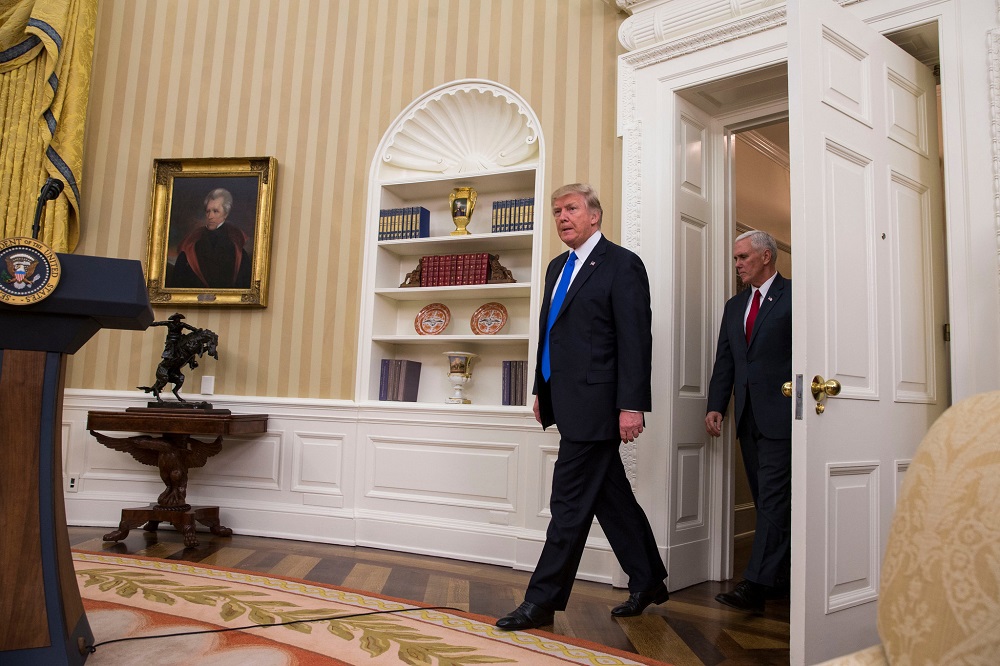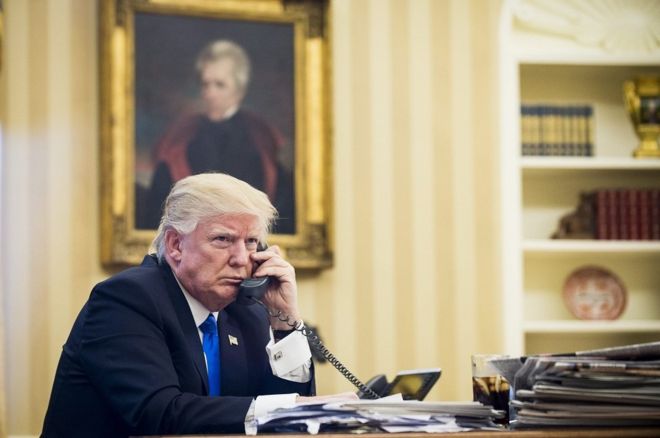
Weekends seems to be the most turbulent for President Donald Trump, and while his immigration ‘ban’ was unfolding, another storm was brewing on his phone call with Australian Prime Minister Malcolm Turnbull.
If it had been China, it would be understandable (obviously Russia would never happen with that Trump / Putin bromance), but Australia? That’s the last country you’d think there would be issues with besides Canada. America has worked with Australia for over a century so what happened? What made Trump accuse Australia of trying to export the “next Boston bombers,” under a refugee resettlement deal?
Do you believe it? The Obama Administration agreed to take thousands of illegal immigrants from Australia. Why? I will study this dumb deal!
— Donald J. Trump (@realDonaldTrump) February 2, 2017
After all the mess created last weekend with refugees, a picture starts to form and make sense, at least through Trump’s eyes.
With that one tweet, Trump caused plenty of worry among both Republican and Democratic parties, even getting John McCain to act as peacemaker.
“I asked Ambassador Hockey to convey to the people of Australia that their American brothers and sisters value our historic alliance, honor the sacrifice of the Australians who have served and are serving by our side, and remain committed to the safer, freer and better world that Australia does far more than its fair share to protect and promote,” McCain said in a statement.
“On the Fourth of July, 1918, American and Australian soldiers fought side-by-side at the Battle of Hamel. In the century that followed, our two nations struggled and sacrificed together in World War I and World War II, Korea and Vietnam, Afghanistan and Iraq. Those of us who took part in the conflict remember well the service of more than 50,000 Australians in the Vietnam War, including more than 500 that gave their lives.
“Today, Australia is hosting increased deployments of U.S. aircraft, more regular port visits by U.S. warships and critical training for U.S. Marines at Robertson Barracks in Darwin. This deepening cooperation is a reminder that from maintaining security and prosperity in the Asia-Pacific region to combating radical Islamist terrorism, the U.S.-Australia relationship is more important than ever.
“In short, Australia is one of America’s oldest friends and staunchest allies. We are united by ties of family and friendship, mutual interests and common values, and shared sacrifice in wartime.”
The call between Trump and Turnbull came at the end of a day of widespread protests and confusion over Trump ‘s order for a 120-day halt of the U.S. refugee program and a 90-day suspension on visits from people from seven predominantly Muslim countries.
Many of the people being held in the Australia n detention centers, which have drawn harsh criticism from the United Nations and human rights groups, fled violence in countries such as Afghanistan, Iraq and Iran.
White House spokesman Sean Spicer said Trump was “unbelievably disappointed” and “extremely, extremely upset” with the deal, but said it would go ahead.
Spicer said all refugees presented to the United States would be subject to “extreme vetting” to ensure they do not pose security risks.
Turnbull told reporters he was surprised and disappointed that details of the call with Trump had been leaked but gave few particulars other than to deny reports Trump had hung up on him.
“As far as the call is concerned, the report that the president hung up is not correct. The call ended courteously. And as far as the nature of the discussion, it was very frank and forthright,” he told a Sydney radio station on Thursday.
Australia n Ambassador to the U.S. Joe Hockey had a “productive meeting” with White House chief of staff Reince Priebus and top strategist Steve Bannon on Thursday, a White House official said, adding the men had conveyed Trump ‘s “deep admiration for the Australia n people” during the meeting.
Political analysts said the acrimony between the two countries was unprecedented, surpassing even the difficult relations between former U.S. President Richard Nixon and then- Australia n Prime Minister Gough Whitlam, who withdrew the country’s troops during the Vietnam War.
“Even that was always done in the language of foreign policy niceties,” said Harry Phillips, a political analyst of 40 years experience at Edith Cowan and Curtin universities in Perth.
Amid the drama over a refugee resettlement deal between Australia and the United States, the White House has issued a series of conflicting statements on whether the agreement is still on, how many refugees it involves, and who, exactly, are the refugees. A look at what’s at stake:
AUSTRALIA DOESN’T WANT BOAT REFUGEES
Under the Obama administration, the U.S. agreed to resettle a group of refugees who are being held at detention camps on the impoverished Pacific island nations of Nauru and Papua New Guinea. The Australian government pays both countries to house the refugees because it refuses to settle any of them in Australia. That has resulted in many of them languishing inside the detention facilities for years. The conditions at the camps are grim, and reports of detainees suffering abuse and attempting suicide are frequent.
UNCLEAR HOW MANY ARE GENUINE REFUGEES
President Donald Trump has repeatedly described the refugees as “illegal immigrants” and said in a tweet that there are “thousands” of them. The refugees are, in fact, among around 1,250 asylum seekers who were transferred to the island detention centers after being intercepted while trying to reach Australia by boat. Another 370 who came to Australia for medical treatment and then refused to return to the islands are also eligible for resettlement to the United States. Australia will not say how many of the asylum seekers have been deemed genuine refugees, and thus it’s unclear exactly how many refugees the U.S. agreed to ultimately accept. Most of the asylum seekers come from the Middle East, Africa and Asia. Australia’s previous center-left government called them “irregular maritime arrivals,” because a refugee can legally seek asylum in a country such as Australia that is a signatory to the United Nations Refugee Convention – which calls on nations to take in people fleeing war. The current conservative government changed the terminology to “illegal maritime arrivals,” presumably because people smuggling is illegal and most pay people smugglers to ferry them to Australia.
THEIR PREFERRED DESTINATION IS AUSTRALIA
Asylum seekers who attempt to reach Australia by boat generally travel to Indonesia, where people smugglers jam them into overcrowded, barely seaworthy vessels that then head south to Australia. In 2013, Australia imposed tough policies toward asylum seekers in a bid to discourage the dangerous and often deadly journeys. Under the strict rules, any asylum seeker who tries to reach Australia by boat can never be settled in Australia, and is instead sent to the detention camps on Nauru and Papua New Guinea where their refugee claims are assessed. Prior to the U.S. deal, the only option given to those deemed genuine refugees was for them to resettle in Papua New Guinea or Cambodia. Few refugees have accepted those offers, opting instead to remain in detention in the hopes that Australia will eventually take them in.
CONTRADICTING STATEMENTS
Over the weekend, Prime Minister Malcolm Turnbull and Trump had a tense telephone call in which they discussed the agreement. On Monday, Turnbull told Australians that Trump had vowed during the call to honor the deal. But a report from The Washington Post that subsequently emerged suggested the agreement might be in doubt. The newspaper reported that during the call, Trump ranted to Turnbull that it was “the worst deal ever.” Shortly after that report was published, Trump took to Twitter to slam the agreement as “dumb” and said he would review it. Meanwhile, the State Department offered reassurance that the agreement would, in fact, stand – “out of respect for close ties to our Australian ally and friend.” White House spokesman Sean Spicer also confirmed that Trump had agreed to honor the deal, though he said all the refugees would be subjected to “extreme vetting.” Later, Trump told reporters that he has to “respect” actions of the previous administration, yet quickly added: “But you can also say, ‘Why are we doing this?'” Spicer then gave another press conference in which he said that Trump was “unbelievably disappointed” in the agreement and had “agreed to continue to review that deal.”


